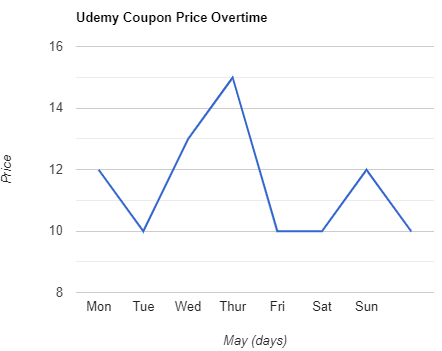Dissecting Ruby on Rails 5 - Become a Professional Developer (Udemy.com)
Don't simply follow a tutorial, learn what it really takes to become a pro Rails developer with this immersive course.
Created by: Jordan Hudgens
Produced in 2022
 What you will learn
What you will learn
- Build a professional Rails application.
- Implement advanced JavaScript components, such as persistent drag and drop functionality and live page update via ActionCable into a Rails application.
- Deploying a Rails application along with the ActionCable web socket feature to Heroku.
- Build a Rails 5 application that utilizes multiple layouts.
- Build jQuery and CoffeeScript components that can be utilized by the Rails application.
 Quality Score
Quality Score
Overall Score : 96 / 100
 Live Chat with CourseDuck's Co-Founder for Help
Live Chat with CourseDuck's Co-Founder for Help
 Course Description
Course Description
Through the years I've constantly heard the same question from students: "I can follow a tutorial, but I don't feel confident enough to build apps/features from scratch". This course is my answer to that question. I'm not satisfied in simply teaching you how to build an application, my goal is to teach you to understand how to build professional web applications, not to simply follow a tutorial. This is the most comprehensive course I've ever put together and combines my 14+ years of development experience.
I took a completely different approach in building this course. This course is unique for a number of reasons:
- Curriculum - After completing the initial course outline I sent it out to a group of CTOs and Senior Rails developers from around the world. I asked them to go through the list of features and add the full set of skills they look for when hiring Rails devs. The course outline literally doubled based on their input. So the features that we're going to build throughout this course aren't simply my idea of what it takes to build progressional grade Rails applications, it's the combined knowledge over over a dozen premier developers from a wide variety of industries. One of the hiring managers who reviewed the outline responded to the outline and said, "If you send me developers who build this full set of features, I'll hire them on the spot!".
- Deep Dives - Going through tutorials is great. However, many times courses that simply walk through the build out of a project skip over important concepts. For this reasons I have created a Deep Dive at the end of each section of this course. These guides select the most challenging topics of each section and give a detailed walk through of the concept so that you can completely understand how to work with the key features of the Rails framework.
- Full Stack - Many courses promise to teach you how to become a full stack developer, but most of them simply gloss over the concepts that you need in order to build truly professional applications. This course was built to walk you through a real world approach to full stack coding. This includes: backend development with Ruby on Rails, front end coding with HTML/CSS/JavaScript/jQuery, along with advanced ways to use SQL for database management.
- Immersive - This is not a light and easy course that you can go through in a weekend. This course was designed specifically for coding bootcamp students that have the goal of becoming professional developers. This means that there is over 35 hours of video lessons and you will build a professional grade Rails application by the time you have completed the course.
- Building out a professional Rails environment (if you're on a PC I even built a free C9 dashboard that you can use for this course).
- We'll utilize Pivotal tracker to follow SCRUM project management best practices throughout the build of this application, just like you'll do in a professional dev shop.
- Examine how to work with Rails generators, including how to customize the generators so that you can have your very own scaffolds.
- Work with data flow in Rails. One of my strongest beliefs is that if you can understand how data flow works in Rails, you can build anything! With that in mind we'll take a step by step approach for understanding how data comes into a Rails app and how you can build features that utilize the process.
- Manage a database. You'll learn advanced SQL techniques for working with data in a Rails application, including how to manage data relationships between tables along with what it takes to implement efficient queries.
- Best practices. Writing clean code is one of the key requirements of professional Rails developers, throughout the course we'll walk through what professional grade code looks like and the common patterns you'll need to know in order to build well written applications.
- JavaScript and jQuery components. One of the hallmarks of a modern Rails application is the proper integration of JavaScript features. Throughout the course we'll walk through advanced JavaScript features such as how to integrate drag and drop functionality for users and how to build dynamic forms that change based on user input, all without a page refresh!
- Streaming Live Data/Page Updates with ActionCable. The top new feature in Rails 5 was definitely Action Cable, which allows for Rails to utilize web sockets and have live page updates. In this course we'll build a real time commenting feature for our portfolio that will showcase your JavaScript skills to everyone who visits your new site.
- API Integration. Because most modern applications need to communicate with the outside world, in this course we'll build an integration with the Twitter API to pull in real time tweets into our portfolio application.
- RubyGem Libraries. In addition to teaching you about how to use RubyGems in a Rails application, I also show you how to create your very own RubyGem from scratch and walk through how to use it in your application.
- In addition to all of these features, we'll also examine: advanced forms, how to integrate professional styles by leveraging Bootstrap 4, building a connection to AWS for file uploads, and how to deploy our application to the web.
I look forward to going through this immersive program with you and good luck with the coding!Who this course is for:
- This course is for someone who wants to learn how to build professional grade Ruby on Rails applications
- This course is for developers that want to learn advanced features specific to the Ruby on Rails version 5 framework, such as ActionCable
 Instructor Details
Instructor Details

- 4.8 Rating
 50 Reviews
50 Reviews
Jordan Hudgens
Jordan Hudgens is the CTO and Founder of DevCamp where he leads instruction and curriculum development for all of the DevCamp and Bottega code schools around the US.
As a full stack developer for over the past decade, Jordan has traveled the world building applications and training individuals on a variety of technology stacks, including: Ruby on Rails, Python, React JS, React Native, JavaScript, and TypeScript, with a speciality in API and machine learning development.
Jordan has developed applications for Quip, Eventbrite, and DevCamp. As a teacher, he focuses on project driven education, with a focus on jobcentric techniques. This means that he focuses specifically on teaching the skills needed in the development industry. This style of teaching is conducive to learning how to build real world products that adhere to industry best practices.
Additionally Jordan has published multiple books on programming and computer science for Packt Publishing, along with developing training curriculum for Bottega, Learn Co, DevCamp, and AppDev on the topics of Ruby on Rails, Java, AngularJS, NoSQL, API development, TypeScript and algorithms.







